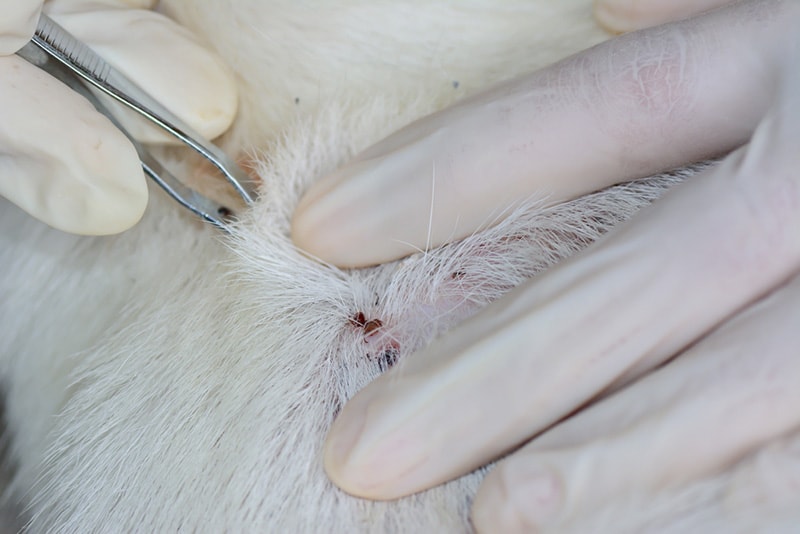Why Does My Dog Sleep So Much? 10 Vet-Reviewed Reasons
Updated on

Click to Skip Ahead
Did you know that dogs spend around half their lives asleep?
Sleep is a normal part of a dog’s day, with the average dog sleeping for around 10-14 hours a day. Most of the other half of their day is spent relaxing, eating, and cuddling us, between bursts of wildly energetic activity.
Dogs need a lot of sleep because it helps their brains develop, keeps their immune systems strong, puts them in a good mood, and helps them recover from all the energy they burn from playing, exercising, or exploring. While it is perfectly normal for your dog to spend more time asleep than you do, it can become concerning if it feels as though all your dog ever does is sleep. There are several reasons why some dogs sleep so much, many of which are completely normal, but sometimes they’re not and can be a warning sign.
We’re going to explore the different reasons below, so keep reading!
When Is Too Much Sleep a Sign of Concern?
The amount of sleep a dog needs differs depending on their breed and age. It is normal for a puppy to sleep more than an adult dog, or for a giant breed to sleep more than a medium-sized dog breed. However, too much sleep can be an indication that something is wrong, particularly if your dog has suddenly started sleeping a lot more than they usually do.
Another indication that something may not be right with your dog is if they’re hard to wake up, or need a lot of encouragement to get out of bed. If there is a day or two where your dog has decided to sleep in, don’t stress too much. However, if they start to do it regularly, it would be a good idea to book an appointment with your vet and start jotting down your dog’s sleeping patterns to help your vet with their diagnosis.
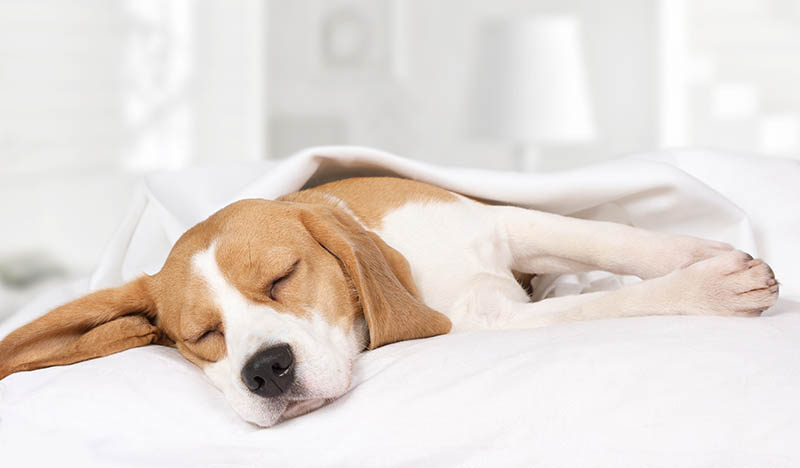
- Choosing sleep over food
- Vomiting or diarrhea
- Struggling to breathe, or breathing fast when sleeping or lying down
- Experiencing pain or stiffness when getting up
- Behavioral changes
- Confusion or disorientation
- Incoordination or wobbliness when walking (ataxia)
- Lack of interest in play or exercise
- A sudden increase in amount of time sleeping
The 10 Reasons Why Your Dog Sleeps So Much
1. Breed
Certain dog breeds are known to be couch potatoes because of how much they like to sleep and lay around. These breeds tend to be larger, such as Saint Bernards and Mastiffs. Large breeds grow at a much faster rate than smaller breeds, which uses up a lot of energy. They also naturally use more energy than smaller breeds, even if they’re doing the same activities. The more energy that is used will result in more sleep to recover.
Breeds that are no longer used as working dogs, such as Great Danes, are happy to partake in family activities but will retire to their bed when there is nothing better to do. They also often prefer to sit next to their owners at the park than run around with higher-energy dogs. However, these dogs should still receive moderate exercise to remain healthy.
At the other end of the size spectrum, chihuahua parents will know that one of this diminutive breed’s favorite ‘activities’ is sleeping. This is likely due to the fact that their little legs have to work pretty fast to keep up with everyone else!

2. Age
Because sleep plays such a big role in the development of a dog, growing puppies need all the sleep they can get. Puppies play a lot and burn energy through all their activities, which means they need sleep to recharge. They’re also learning so much in those early days, from house training to obedience training, and sleep helps the puppy remember everything they learned throughout the day and helps them understand it better.
Senior dogs also need more sleep because they have less energy and can’t handle as much activity as they once were able to. As your dog ages, you’ll notice that they’ll get tired faster, so shorter walks and less strenuous activity are recommended. Although more sleep is normal, there are a few things that aren’t, such as sleeping all day and staying awake at night, sleeping in unusual spots, sleeping while standing, and not waking up when you call them. If you notice these signs, you should take them to the vet.
3. Health
Any form of illness can cause your dog to spend a lot more time sleeping, but there are some diseases that can particularly lead to an overly sleepy pooch.
A dog that has hypothyroidism will experience a decrease in their metabolic function, which is the process a dog’s body goes through to turn the food they eat into the energy they need to fuel their bodies. A slow metabolism will slow down their bodily functions. A dog with this condition may become very lethargic and sleep a lot more. You’ll also likely notice that they’re gaining weight, losing hair, and several other unusual signs.
Diabetes is another health issue that could cause your dog to sleep more, with certain breeds being predisposed to it. Dogs that are older or obese are also at risk for developing diabetes, as well as being overly sleepy. Symptoms that are common with this disease are increased thirst, lethargy, loss of sight (due to diabetic cataracts), poor appetite, and recurring infections. Lethargy and excessive sleep are symptoms of many health problems, which is why it is important to have your dog examined by a vet.
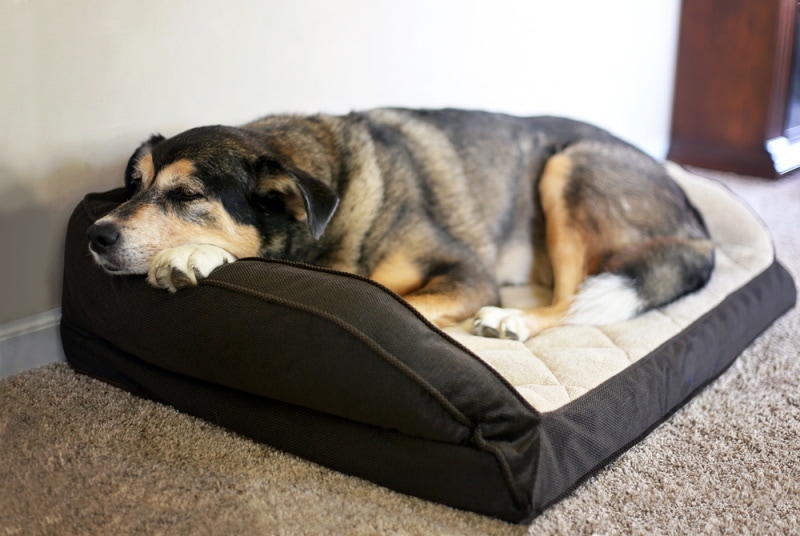
4. Hot Weather
Like humans, dogs can also feel the effects of a hot summer’s day. The heat can leave your dog feeling hot, bothered, and lethargic, causing them to sleep more. You can help your dog cool down by having them splash around in the pool with you, offering them ice blocks, or giving them a cool bath. It’s important to keep your dog hydrated on hot days and out of the direct sun.
When your dog’s body temperature rises above average due to the heat and a lack of good ventilation, they are at risk for heat stroke, which can cause them to sleep more than usual. They may also breathe rapidly, have dry gums, become disorientated, and have seizures. It generally occurs on hot days when dogs are left in cars, don’t have access to shade, don’t have water to drink, or are exercised vigorously.
When the weather is hot, let your dog rest up. It is far better for them to miss out on a walk than to suffer from heat stroke.
5. Boredom
Dogs that don’t have much stimulation in their environment tend to sleep more out of boredom. However, it depends on the breed because some breeds will act out through digging, barking, and other destructive behavior if they’re left at home with nothing to do.
You can help your dog feel engaged in their environment by implementing a routine, getting them food puzzles that will stimulate them mentally, placing different toys in their environment, and taking them on walks, drives, and other daily activities. The goal is to get your dog excited about more than just their bed.
6. Vigorous Exercise
Dogs that are exercised often or who have worked too hard may come back from their activity ready to gulp up some water, take a break from the world, and have a nap. Just as humans need to relax after a gym session, dogs need to recover, too.
Your dog might be sleeping more because they’re exercising more or for longer periods. It could be the result of hiring a new dog walker, welcoming a new puppy into the home that your dog plays with often, or because you’re training for a race. Sleep is an excellent way for the body to heal itself and repair tissue, as exercise can leave your dog sore and achy. So, if your dog takes a nap after a run, let them – their body needs it.
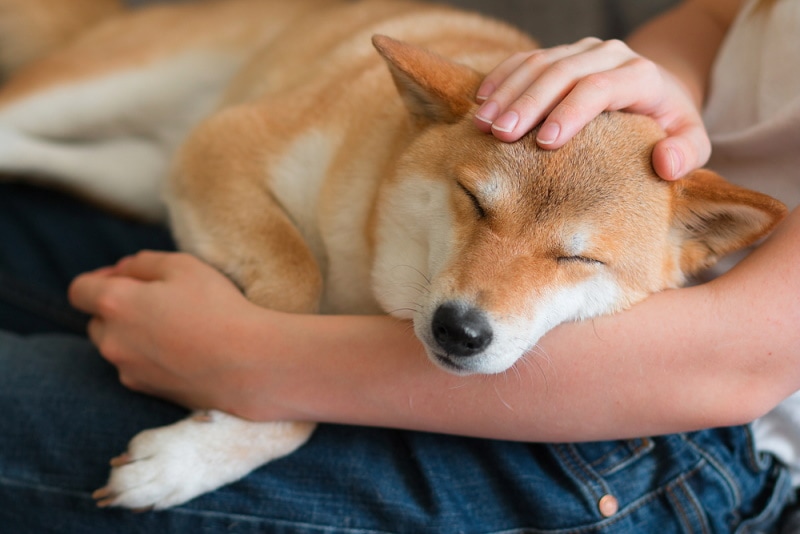
7. Depression
If your family recently lost a loved one—human or pet—your dog may become depressed. Big life changes, such as moving homes or getting injured, can also bring about depression in your dog, but the signs may look different depending on the cause. Thankfully, canine depression usually doesn’t last long, but it can cause them to stop eating, become much clingier, withdraw, hide, be more vocal, act out, have no interest in play, and they may become lethargic and sleep a lot more.
You can help a depressed dog by getting them around other dogs or different people, so that they can play and interact with them. You could also bring more stimuli into their environment with toys and food puzzles; take them on adventures through hiking, car drives, swimming, and other activities, and make sure they’re eating by changing up their food and adding toppers to their kibble to make it more enticing.
If you have suffered the loss of a human or animal family member, one of the healthiest things for you to do is get back to a normal routine. Of course, a period of grieving is natural, but giving special treatment to your dog for too long can prolong their feelings of sadness and confusion. Returning to a normal routine, especially if that involves walks outside, can be very therapeutic for you both.
8. Poor Nutrition
What your dog eats each day has a massive impact on their health, as well as their energy levels. Dog food can be pricey, but it is important to invest in your dog’s health by getting them good quality food that is nutritionally balanced and complete. A dog with a poor diet isn’t receiving the vitamins and minerals they need to thrive and will become lethargic and want to sleep the day away. They also won’t have the energy they need to play and exercise, which will lead to further complications.
Poor nutrition will cause your dog to have bad breath, dandruff, a dry and brittle coat, fur loss, gas, skin issues, stunted growth, and various infections and diseases.
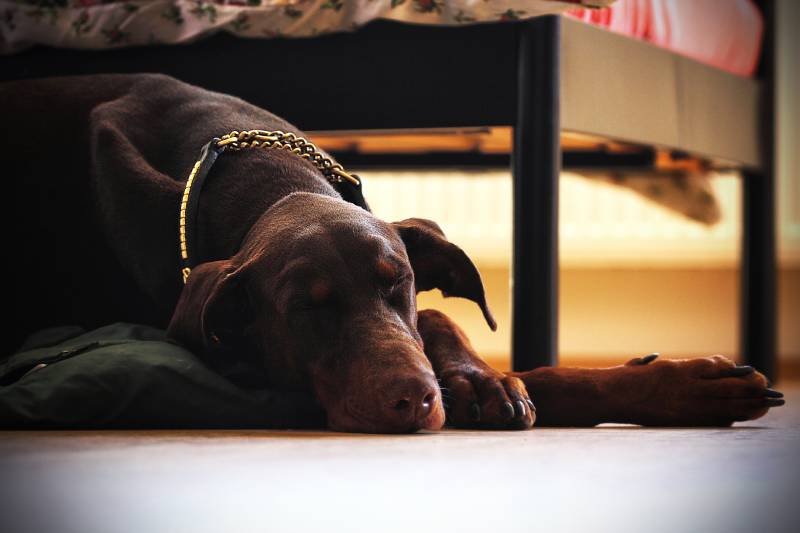
9. Stress
Although dogs can’t voice how they feed, they can experience stress. You’ll see signs of it in their body language and actions, which could include pacing, shaking, whining, licking, shedding, panting, uncontrolled urinating, loss of bowel function, hiding, and yawning. They may even try to deal with the stress they feel by going to sleep.
You can help your stressed dog by remaining calm, as dogs can pick up on your emotions and sense your stress levels. Exercise is a great way to relieve stress, as well as setting up safe spaces for your dog, such as a crate, which they can escape to and find comfort in.
10. Mental Stimulation
Have you ever taken your dog somewhere with lots of activity of people or other dogs and found them sound asleep for hours after? Mental stimulation can be really exhausting for our dogs, and is another way to keep them enriched and interested in the world, particularly if you have a dog that is limited in how much physical activity they can do.
If you have a dog with an injury or is recovering from a surgery, it can be really helpful to immerse them in an interesting (but not overwhelming) environment, where they can meet different people and watch different things. This can help tire them out without causing injury. Be sure to check with your vet before taking an injured or postoperative dog out on an adventure though, even if they are going to be carried.
How to Prevent Boredom
Dogs that don’t have too much going on will often sleep more out of boredom. If you’re determined to keep your dog awake for longer, you can do this through mental and physical stimulation.
You can give your dog a variety of different toys to play with that are new and exciting. Like humans, dogs get bored of playing with the same toys, so swap out their old toys for new ones every few days and then swap them back in a few days later. This will keep your dog interested in their toys for much longer and get them excited to play with them. If your dog is food motivated, place kibble in their toys or hide some around the house; as this will keep their attention for longer periods as they try to get to the food.
Exercise is an important part of every dog’s life because it keeps them fit and healthy. It also stimulates them and adds variety to their day. Most dogs get excited to go on walks and will eagerly choose activity over a nap.
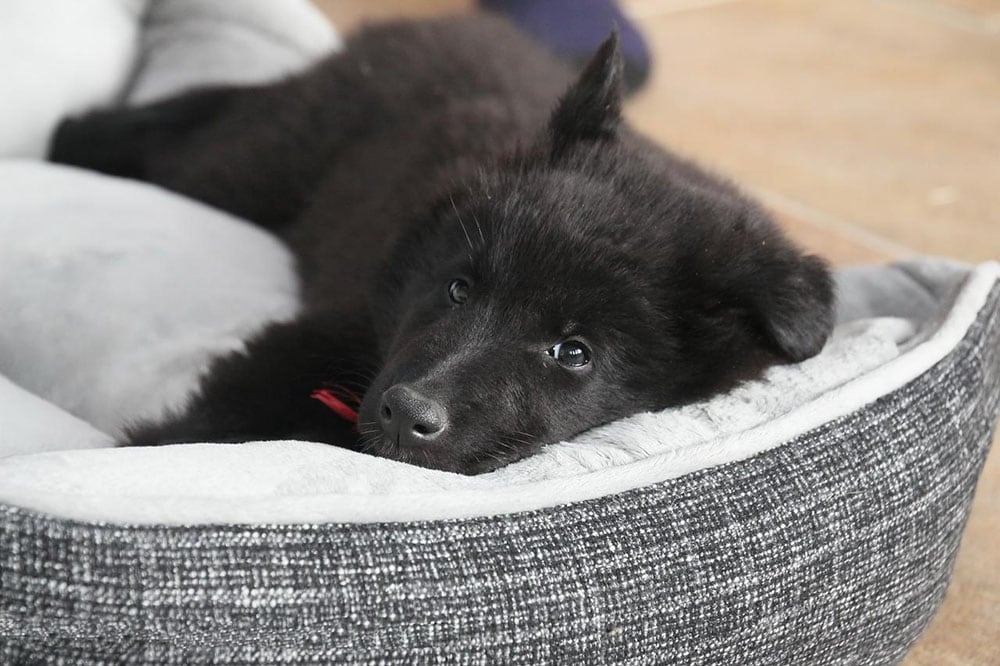
Should I Wake My Dog Up?
If you’ve exercised your dog and they’ve spent time playing with their toys, they likely need sleep to recover from their activities. Remember that sleep is important for a dog’s development and recovery and is a normal part of their day. This is particularly important for puppies.
Not only is this sleep necessary, but waking your dog up from a deep sleep can be dangerous. They may wake up startled and lash out by snapping at you. Interfering with their REM sleep will affect their mood and memory and could cause them to wake up tired.
If you need to wake your dog up, do it gently so as not to startle them. You can call out their name from a distance, shake their food container, or drop a treat under their nose.
Conclusion
Dogs sleep a lot because it helps them recover from the energy they burn through activities, make sense of the day, and improve their moods. Large dog breeds tend to sleep more because they naturally exert more energy. Puppies also need plenty of sleep because they’re developing physically and mentally.
However, if your dog’s sleeping patterns have changed, it could be because they’re sick, struggling with the heat, exhausted from increased exercise, depressed, not getting the nutrition they need, or stressed. It’s important to take your dog to the vet if their sleep has increased and you aren’t sure why.
Featured Image Credit: 632imagine, Shutterstock





